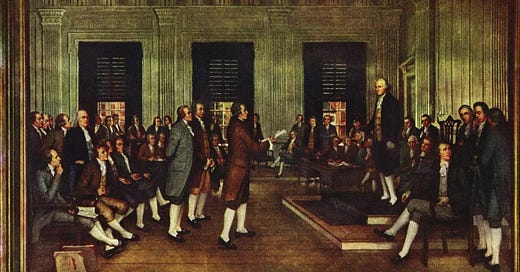The Constitution Isn’t Broken; We Are
New Supreme Court rulings on executive power show not that the system is broken, but that political activists need to focus on persuasion

One of the more interesting rulings in a very consequential Supreme Court term is West Virginia v. EPA, in which the court reined in the power of unelected bureaucrats in the administrative state. It is a ruling not just about the particular issue at hand, but about the functioning, or lack thereof, of the entire American political system.
The EPA has been planning and implementing new regulations on the power industry in the name of stopping climate change, but its legal authority for doing so is the Clean Air Act, which was originally passed in 1963 and last amended in 1990, back when “climate change” was still called “global warming” and well before it became a widely accepted political crusade. The Clean Air Act’s original purpose was to regulate emissions of toxic and disease-causing substances, such as lead or large particulates. But West Virginia—which has an obvious interest in the continued survival of coal mining—argued that the EPA’s regulation of greenhouse gas emissions goes beyond what was authorized in any version of the Clean Air Act and amounts to an unauthorized attempt to restructure the entire energy industry.
In the Court’s majority opinion, which sided with West Virginia, Chief Justice John Roberts cited the “major questions doctrine,” according to which Congress must “speak with particular clarity when it authorizes executive agencies to address major political and economic questions.” In other words, a congressional delegation of decision-making power to an executive agency such as the EPA must be narrow and specific, rather than an open-ended grant of power.
Here is how Justice Neil Gorsuch put it in his concurring opinion:
When Congress seems slow to solve problems, it may be only natural that those in the executive branch might seek to take matters into their own hands. But the Constitution does not authorize agencies to use pen-and-phone regulations as substitutes for laws passed by the people’s representatives.
“Pen-and-phone” refers to then-President Obama’s vow that if Congress didn’t pass the legislation he wanted, he would use executive power to implement his preferred solution anyway. In effect, he was threatening to use the overbroad delegation of power to executive agencies to usurp the legislative powers of Congress—a favorite tactic of all recent presidents.
This is an obvious overreach, and it is good to see the Supreme Court place some limits on it. But presidents couldn’t usurp legislative power if Congress weren’t so eager to abdicate it. That indicates a wider problem.
A Broken System?
Commentator David French draws an interesting comparison between the EPA case and another recent, seemingly unrelated Supreme Court ruling: the immigration case Biden v. Texas.
What do these cases have in common? They both arose from serious and problematic congressional inaction. In the EPA case, the executive branch was responding to legitimate concerns about climate change, but the executive branch is not supposed to be a lawmaking body. In the “remain in Mexico” case, Congress failed to fund sufficient immigration detention facilities, rendering it impossible for the president to comply with Congress’s mandate that immigrants who are not “clearly and beyond a reasonable doubt” entitled to entry “shall be detained.”
Congress keeps wavering between a more open immigration policy and a more restrictive one but has implemented neither. As a result, the U.S. government cannot admit large numbers of migrants legally, but it does not have the resources to humanely detain them all. So the executive branch is using what leeway it has within the law to deal with the problem. French takes this as evidence that the Constitution isn’t working.
The problem is simply this: Congress was intended to be the most potent branch of government. It is now the most dysfunctional. And it’s dysfunctional in part because the Founders did not properly predict the power of partisanship over institutional responsibility.
Even worse, Congress’s dysfunction radiates to other branches of government. Both the presidency and the judiciary assume more power than they should, escalating the stakes of presidential elections and the intensity of judicial confirmations. In French’s view, the Founders didn’t anticipate the possibility of gridlock and a failure to act on big issues, so something needs to be done. On the contrary, I think the Founders were well aware, from personal experience, of the potential for paralysis on big issues. These are the same people who spent the early years of the republic kicking the can down the road on the issue of slavery. They hoped that the next generation would deal with it, but the next generation dug their heels in further and became even more deadlocked, to the point where their children ended up fighting a civil war over it.
Was the Constitution broken then? No, we were. The people were intractably divided on a fundamental issue, and no constitution can fix that.
The existing constitutional system works just fine when there is general agreement on an issue. It allows plenty of action when that action has broad public support. But it does not allow a minority, or even a narrow majority, to shove through whatever policy it wants because “something has to be done.” That, too, is the system working—it encourages politicians, activists and concerned citizens to create broad support through the power of persuasion.
Yes, the U.S. political system should absolutely prevent us from doing anything about climate change—if the American people are not strongly convinced that this is a real problem or that the proposed solutions are the right ones. And Americans should be happy that this system prevents a strong leader in Washington from imposing his own solution on immigration because it prevents a bad solution just as much as it prevents a good one.
The Consent of the Governed
David French is right, though, that the Founders made a miscalculation when they assumed Congress would jealously guard its power against encroachment by the other branches. Ultimately, Congress proved eager to give it away. It is easy to pass vague bills with broad powers that seem uncontroversial—who could possibly be against “clean air”?—while leaving to unelected bureaucrats the contentious and unpopular job of deciding what those laws actually do.
This process reached its full realization in the tawdry and hopefully brief political career of Madison Cawthorn (R-N.C.), whose only enduring claim to fame (if any) will be his boast that when he assembled his congressional staff, he focused on “comms”—i.e., messaging to the public—rather than on his staff’s ability to draft or understand legislation. This is the perfect congressman of today: He spends all his time pandering to the sentiments of voters back home by complaining about what the other branches of government are doing or not doing—and none of his time passing legislation that actually tells those branches what to do.
For the right, this presents a distinct irony. The central idea of the conservative legal movement is that the courts should not intervene and should require Congress to make decisions on all the “major questions.” The actual policy of conservatives in Congress has been to do nothing of the sort, evading major questions on immigration, spending, entitlements and deregulation. They got a majority in Congress and couldn't even repeal Obamacare, after spending seven years promising to do it, but that would have required them to come up with their own healthcare plan.
That’s the system, and ultimately it’s not a bug, it’s a feature. Our representatives in Congress actually do represent us. To the extent they don’t act to solve a real or imagined problem, whether it’s immigration or climate change, they reflect the actual divisions of the American people. Those who want Congress to act will then have to convince the public—all of the public, not just their faction.
That’s how it’s supposed to work. The whole basis of the American political system, after all, is the consent of the governed. But the corresponding example to the all-comms congressman is Democratic congressional aides protesting against their own leadership to pass a climate change bill—as if they are the constituents rather than the actual voters out in their states and districts. Then again, perhaps an even better example is congressional aides lobbying the president to seize emergency powers to act without Congress.
These incidents indicate the real political realignment America needs: a realignment toward persuasion and debate. What is broken in the U.S. system—the source of the country’s runaway partisanship—is that both sides have largely given up on politics as a contest of ideas and regard it instead as a mere contest of power. But there is no faster way to lose power in the American system than to give up on the contest of ideas.
These repeated tussles over executive power reveal a need to refocus on the art of persuading voters, rather than using court rulings, executive agencies or emergency powers as an end-run around the consent of the governed.





